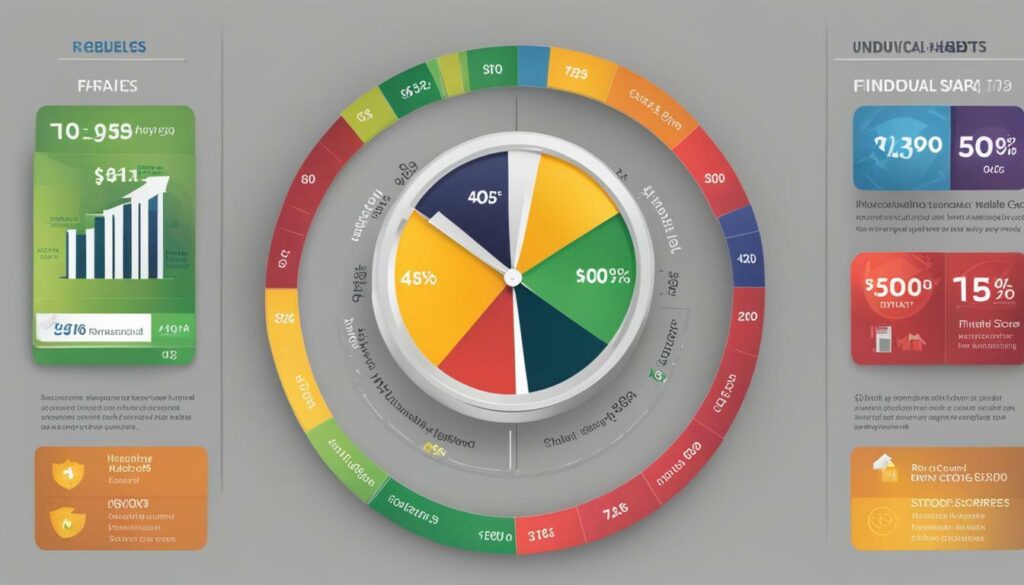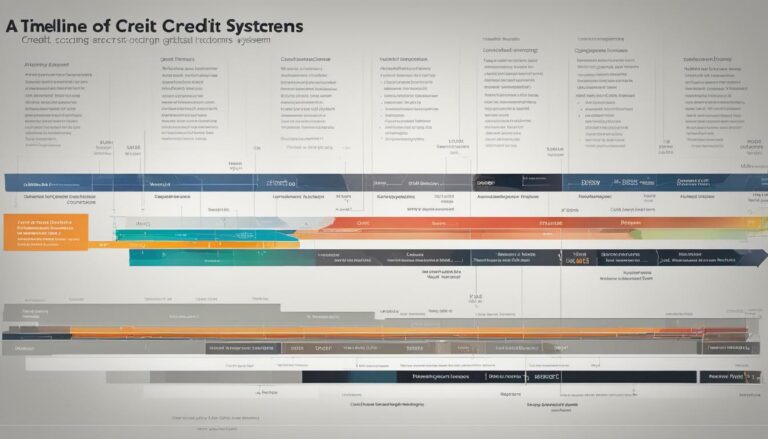Understanding How Family Financial Habits Influence Individual Credit Scores

Family financial habits play a significant role in shaping individual credit scores and overall financial well-being. It is crucial to understand the impact of these habits on establishing a solid credit profile and making informed financial decisions. A person’s credit score, such as the FICO score, is determined by various factors including payment history, amount of debt, length of credit accounts, types of accounts, and history of seeking new credit.
Parents have a crucial role in shaping their children’s financial behaviors, as children often imitate their parents’ spending habits. Teaching children about the different uses of money, including saving, investing, and giving, can help instill responsible financial habits from a young age. As children grow older, parents can also introduce them to credit and help them understand credit card terms, preparing them for future financial responsibilities.
Establishing good credit habits early on can have a significant impact on an individual’s financial future. Responsible borrowing, maintaining a positive credit behavior, and understanding the influence of family financial habits can help individuals build a strong credit profile and achieve financial stability.
- Family financial habits have a significant impact on individual credit scores.
- Understanding the factors that influence credit scores, such as payment history and amount of debt, is crucial.
- Parents play a crucial role in teaching and modeling responsible financial behavior to their children.
- Introducing children to credit and helping them understand credit card terms is important for their financial education.
- Establishing good credit habits early on can have long-term benefits for an individual’s financial future.
Factors Affecting Individual Credit Scores
Several key factors contribute to the calculation of an individual’s credit score, and understanding them is essential for managing personal finances effectively. Payment history is one of the most significant factors influencing credit scores. Consistently making on-time payments demonstrates responsible financial behavior and can positively impact your creditworthiness. Conversely, late payments or defaults can have a detrimental effect on your credit score.
The amount of debt you owe is another crucial factor. Credit utilization, which is the ratio of your outstanding credit card balances to your credit limits, plays a significant role in determining your creditworthiness. Keeping your credit utilization low, ideally below 30%, can help boost your credit score. Additionally, maintaining a healthy mix of credit accounts, such as credit cards, loans, and mortgages, can also positively impact your credit score.
🚨 TUIC Errors + Low Credit Score?
CreditScoreIQ helps you build credit faster by reporting utility bills to all 3 bureaus—while you dispute errors.
Start Building Credit Today →“Your credit score is a reflection of your financial behavior and is used by lenders to assess your creditworthiness.”
Length of credit accounts is another important factor to consider. Having a longer credit history demonstrates stability and responsible credit management. It is beneficial to keep old accounts open, even if they are no longer in active use. Lastly, your history of seeking new credit can also influence your credit score. Frequent credit applications or opening several new accounts within a short period can indicate financial instability, negatively impacting your creditworthiness.
| Factor | Impact on Credit Score |
|---|---|
| Payment History | Positive impact with on-time payments, negative impact with late payments or defaults |
| Amount of Debt | Lower credit utilization can have a positive impact |
| Credit Account History | Longer credit history demonstrates stability |
| Types of Accounts | A healthy mix of credit accounts can positively impact credit scores |
| History of Seeking New Credit | Frequent credit applications or opening new accounts can indicate financial instability |
Understanding these key factors and their impact on credit scores is vital for maintaining a healthy credit profile. By practicing responsible payment habits, managing debt effectively, diversifying your credit accounts, and avoiding unnecessary credit applications, you can improve your creditworthiness and unlock better financial opportunities in the future.

Family financial behavior has a significant influence on an individual’s credit scores, as children often model their financial habits after their parents’. This creates a unique opportunity for parents to shape their children’s financial behavior from an early age. Teaching children responsible financial practices can help them establish good credit habits that will benefit them throughout their lives.
Parents play a crucial role in instilling these habits by demonstrating responsible financial behavior themselves. Children observe their parents’ spending habits, saving practices, and attitudes towards money, and are likely to emulate those behaviors. By setting a positive example, parents can help their children develop good financial habits and make informed financial decisions in the future.
Educating children about the different uses of money is an important step in teaching them responsible financial behavior. This includes teaching them about saving, investing, and giving. By introducing these concepts early on, parents can help children understand that money is not only meant for spending, but also for building a secure financial future.

As children grow older, parents can also introduce them to the concept of credit and help them understand credit card terms. Teaching children about credit at a young age can help them develop a healthy relationship with borrowing and debt. It is crucial to emphasize responsible credit usage and educate children about the potential risks and consequences of mismanaging credit.
Establishing good credit habits early on can have a significant impact on an individual’s financial future. By teaching children about responsible financial practices and modeling these behaviors themselves, parents can help their children develop a solid credit profile and make informed financial decisions throughout their lives. Understanding the influence of family financial behavior on individual credit scores is essential for building a strong financial foundation.
Teaching Financial Habits to Children
Teaching children about financial habits and money management is crucial for developing healthy financial behaviors that can positively impact their credit scores in the future. By instilling smart money practices from a young age, parents can help set their children up for financial success.
One effective way to teach children about financial habits is by involving them in age-appropriate money management activities. For example, parents can create a weekly allowance system where children are responsible for budgeting their money for different purposes, such as saving for a future goal or giving to a charitable cause. This hands-on experience helps children understand the value of money and the importance of making thoughtful financial decisions.
Additionally, parents can introduce children to the concept of compound interest and the benefits of saving money in a bank account. This can be done by setting up a savings account for the child and encouraging regular deposits. Watching their savings grow over time can be a motivating factor for children to continue practicing good financial habits.
Furthermore, teaching children about the potential risks and rewards of credit is essential in today’s financial landscape. Parents can explain the concept of credit, introduce basic credit card terms, and discuss the importance of responsible borrowing. By equipping children with this knowledge early on, they will be better prepared to navigate the complexities of credit as they enter adulthood.
“Teaching children about financial habits from a young age empowers them to make wise financial decisions in the future.”
Table: Money Management Activities for Children
| Activity | Description |
|---|---|
| Weekly Allowance | Give children a set amount of money each week and encourage them to budget for different purposes like saving, spending, or donating. |
| Savings Account | Open a savings account for your child and teach them the benefits of saving money, including earning interest. |
| Financial Goal Setting | Help children set financial goals, whether it’s saving for a specific purchase or building an emergency fund, and track their progress. |
Teaching children about financial habits from a young age empowers them to make wise financial decisions in the future. It sets the foundation for responsible money management and plays a significant role in shaping their credit scores as adults.

In conclusion, educating children about financial habits and money management is crucial for their financial well-being. By introducing them to concepts such as budgeting, saving, and responsible borrowing, parents can help cultivate healthy financial behaviors that will positively impact their credit scores and overall financial future.
Introducing Credit to Children
As children grow older, it becomes essential to introduce them to the concept of credit and help them understand the terms and responsibilities associated with credit cards. Teaching children about credit at a young age can lay the foundation for responsible financial habits in the future. By educating them about credit card terms and how to manage credit responsibly, you can empower them to make informed choices and avoid potential financial pitfalls.
Financial education plays a vital role in ensuring children develop a healthy relationship with credit. Introducing them to the idea of credit cards, credit limits, interest rates, and minimum payments can help demystify these financial concepts. It is also important to emphasize the importance of paying bills on time, avoiding accumulating excessive debt, and keeping an eye on their credit utilization ratio.

Using real-life examples and practical exercises, parents can guide their children through the process of responsible credit usage. Consider creating a table that compares credit card offers and helps them understand the terms and conditions. Encourage them to ask questions and seek guidance when needed. By instilling good credit habits early on, you can set them on a path towards financial success and independence.
Establishing Good Credit Habits
Establishing good credit habits is crucial for laying a solid foundation for financial success and ensuring a positive credit history. Your credit behavior can significantly impact your financial future, influencing your ability to secure loans, buy a home, or even secure certain job opportunities. By developing responsible borrowing practices and maintaining a positive credit behavior, you can set yourself up for long-term financial stability.
One of the key elements of good credit habits is maintaining a consistent payment history. Paying your bills on time shows lenders that you are reliable and responsible with your finances. Late or missed payments can have a detrimental effect on your credit score, so it’s important to prioritize timely payments.
Additionally, it’s crucial to keep your credit utilization ratio low. This ratio refers to the amount of credit you are using compared to your total available credit. Aim to keep your credit utilization below 30% to demonstrate that you are not relying heavily on credit and can manage your debts effectively.
Lastly, it’s important to be mindful of the types of credit accounts you have. A diverse mix of credit accounts, such as credit cards, loans, and mortgages, can showcase your ability to handle different financial responsibilities. However, it’s essential to only take on as much credit as you can comfortably manage. Taking on excessive debt can negatively impact your creditworthiness.
| Credit Behavior Tips | Actions |
|---|---|
| Pay your bills on time | Set up automatic payments or create reminders to ensure timely payments |
| Monitor your credit utilization | Regularly check your credit card balances and aim to keep them below 30% of your total credit limit |
| Diversify your credit accounts | Consider having a mix of credit cards, loans, and mortgages to showcase your ability to manage different types of credit |
| Avoid excessive debt | Only take on as much credit as you can comfortably manage and avoid maxing out credit cards or taking on unnecessary loans |
“Your credit history is a reflection of how you handle your financial responsibilities. By establishing good credit habits early on, you can set yourself up for a brighter financial future.”
By implementing these credit behavior tips and making responsible financial choices, you can build a strong credit profile that will benefit you in the long run. Developing these habits early in life and passing them on to future generations can contribute to a cycle of financial well-being within your family.

Establishing good credit habits is essential for securing a solid financial future. By focusing on responsible borrowing, maintaining a positive payment history, and managing credit utilization, you can build a strong credit profile. Remember to diversify your credit accounts and avoid excessive debt. By implementing these strategies, you can lay the groundwork for financial success and set a positive example for future generations.
Conclusion
Understanding the relationship between family financial habits and individual credit scores is essential for shaping a secure financial future and making informed financial decisions. A person’s creditworthiness, as assessed by their FICO credit score, is determined by various factors, including payment history, amount of debt, length of credit accounts, types of accounts, and history of seeking new credit.
Parents play a crucial role in shaping their children’s financial habits, as children often learn by observing and imitating their parents’ spending behavior. By teaching kids the different uses of money, such as saving, investing, and giving, parents can instill responsible financial habits from a young age, helping to combat the notion that money is solely meant for spending.
As children grow older, parents can further guide them by introducing the concept of credit and helping them understand credit card terms. This early introduction to credit and financial education can lay the foundation for responsible credit usage and financial decision-making in the future.
Establishing good credit habits early on can have a significant impact on an individual’s financial future. By maintaining responsible borrowing practices and a positive credit behavior, individuals can build a solid credit profile that opens doors to a range of opportunities, from obtaining favorable loan terms to achieving financial goals.
In conclusion, understanding how family financial habits influence individual credit scores is crucial for establishing a secure financial future. Parents have the power to shape their children’s financial behavior and teach them responsible money management skills. By instilling good credit habits and providing financial education, parents can empower their children to make informed financial decisions and set them on a path towards long-term financial success.
FAQ
Q: What factors affect individual credit scores?
A: Individual credit scores are influenced by factors such as payment history, amount of debt, length of credit accounts, types of accounts, and history of seeking new credit.
Q: How does family financial behavior influence individual credit scores?
A: Children often mimic their parents’ spending behavior, so family financial habits can have a significant impact on an individual’s credit scores.
Q: How can parents teach financial habits to their children?
A: Parents can teach children about different uses of money, including saving, investing, and giving, to instill responsible financial habits from a young age.
Q: How can parents introduce credit to their children?
A: Parents can help children understand credit and credit card terms as part of their financial education.
Q: What are the benefits of establishing good credit habits?
A: Establishing good credit habits early on can have a significant impact on an individual’s financial future, including responsible borrowing and maintaining a positive credit behavior.
Ready to Improve Your Credit?
Disputing TUIC errors is step one. Step two? Boost your score by reporting utility payments with CreditScoreIQ.
Get Started Now (Only $1 Trial) →3-bureau reporting • $1M identity insurance • Dark web monitoring






